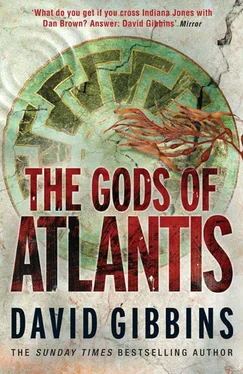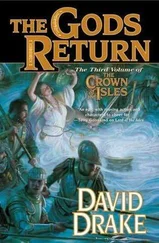David Gibbins - The Gods of Atlantis
Здесь есть возможность читать онлайн «David Gibbins - The Gods of Atlantis» весь текст электронной книги совершенно бесплатно (целиком полную версию без сокращений). В некоторых случаях можно слушать аудио, скачать через торрент в формате fb2 и присутствует краткое содержание. Жанр: Прочие приключения, на английском языке. Описание произведения, (предисловие) а так же отзывы посетителей доступны на портале библиотеки ЛибКат.
- Название:The Gods of Atlantis
- Автор:
- Жанр:
- Год:неизвестен
- ISBN:нет данных
- Рейтинг книги:3 / 5. Голосов: 1
-
Избранное:Добавить в избранное
- Отзывы:
-
Ваша оценка:
- 60
- 1
- 2
- 3
- 4
- 5
The Gods of Atlantis: краткое содержание, описание и аннотация
Предлагаем к чтению аннотацию, описание, краткое содержание или предисловие (зависит от того, что написал сам автор книги «The Gods of Atlantis»). Если вы не нашли необходимую информацию о книге — напишите в комментариях, мы постараемся отыскать её.
The Gods of Atlantis — читать онлайн бесплатно полную книгу (весь текст) целиком
Ниже представлен текст книги, разбитый по страницам. Система сохранения места последней прочитанной страницы, позволяет с удобством читать онлайн бесплатно книгу «The Gods of Atlantis», без необходимости каждый раз заново искать на чём Вы остановились. Поставьте закладку, и сможете в любой момент перейти на страницу, на которой закончили чтение.
Интервал:
Закладка:
‘Noah,’ Costas said.
Jack looked at him, stunned. Noah. It was not possible.
Schoenberg nodded. ‘Noah of course is a name familiar from the Hebrew Old Testament, though it probably has a much older Indo-European origin.’
Costas turned to Jack. ‘Do you remember five years ago at Atlantis joking that we’d also found the basis for the story of Noah’s Ark? You speculated that an organized exodus from Atlantis as the flood waters rose would have included breeding pairs of livestock, even the giant aurochs that they bred for sacrifice.’
Jack stared at the notebook. ‘I don’t think I was joking. This is extraordinary.’ He slowly translated the first sentence: ‘ From here, Noah and Alkaios from Atlantis set sail to the west, to found a new city.’
Schoenberg pointed at the vellum. ‘The word you’ve translated as “city”, polu, the Greek word polis, can mean “city-state” or “state”. The word apo, “from”, before the word Atlantis, is unambiguous, as is the word nea, “new”, before the word for city. They were going from Atlantis, to found a new city. When I saw that in 1942, I believed that the only rational explanation was that the Atlantis myth harked back to the fall of Minoan Crete in the Aegean Sea towards the end of the Bronze Age in the second millennium BC. Geographically this note seemed to make sense, that these two men, Noah and Alkaios, were refugees sailing west from the Aegean through the Mediterranean out into the Atlantic Ocean, to seek lands for a new city. In classical antiquity that would have been a familiar concept, with many Greek cities in the western Mediterranean being founded as colonies of their mother city. But now, with your discovery of a Neolithic Atlantis, I revise my theory. The direction of travel remains the same, from the Mediterranean to the west, but it is vastly older than I could have imagined then, as old as the sixth millennium
BC.’
‘That is, if this comment isn’t just a bit of fantasy made up by a medieval monk,’ Costas said.
‘It’s unlikely that a monk would make up anything involving a Biblical name, as that might have been seen as heresy,’ Schoenberg replied. ‘And the next line in the note clinches it.’
Jack took a deep breath, and read what he had written on the notepad: Alkaios returned, and set up an inscription in unknown writing on the pillar. Ex Pliny.
‘Your translation is most interesting,’ Schoenberg murmured. ‘I translated stulobate, stylobate, as “plaque” or “stela”, a stone panel. But pillar is possible, a stone pillar.’
‘I must have been thinking of the Pillars of Hercules, but actually it does make sense,’ Jack replied. ‘Portuguese explorers in the fifteenth century placed stone pillars, padroes, where they made landfall, to stake claim to new land. We know that Hanno the Carthaginian left an account of his voyage on bronze plaques attached to a pillar in Carthage, and I’ve always imagined that one day someone will find a pillar marking his progress down the coast of west Africa.’
‘Remember what you saw three days ago at Atlantis, Jack?’ Costas said.
‘Three days ago?’ Schoenberg exclaimed. ‘You have been to Atlantis again? He leaned forward, peering at Jack eagerly.
Jack nodded. ‘You’re giving us your treasure, so I’ll give you ours. Absolute secrecy, yes?’
‘Of course. Of course.’
‘Costas and I were able to carry out a dive on the site under the guise of a geological assessment. The fault line’s active again and we ended up diving into a live volcano.’
‘A live volcano.’ Schoenberg leaned back, slapping his knee. ‘ A live volcano. I never heard of such a thing. Marvellous. If only I could have told this to our divers in the Ahnenerbe. But they never had the equipment you have. I believe it was the oxygen rebreathers. They were always going too deep. We lost three of them on our expedition to Iceland. I was there, waiting for them, but they never came up.’
Jack glanced at Costas, then back at Schoenberg. ‘We found an extraordinary temple with carved pillars. We’re sure it dates from the earliest Neolithic, eleven thousand years ago or more. My point is, these people were perfectly capable of erecting stone pillars, and indeed had a tradition of it.’
‘So if this note is based on fact, we’re looking for an inscribed stone,’ Costas said.
‘Somewhere on the coast of west Africa,’ Jack murmured.
‘That narrows it down.’
Schoenberg took the sheet of vellum and held it up to the ceiling light, peering at it closely. ‘There’s more. Those final words, Ex Pliny, are a shorthand to show that the source of the story is Pliny’s Natural History. As you can imagine, I immediately found a copy of Pliny in the Heidelberg library and went to Book 5, Chapter 1, the text that deals with west Africa and the limit of Roman knowledge. There’s the usual Pliny ragbag of facts and myths, including an account of the Hercules myth and the expedition of Hanno. He mentions the Roman emperor Claudius, his war against a local ruler in Mauretania and his founding of Roman colonies at Lixus and Traducta Julia, both probably corresponding to the old Punic outposts in that list in the Periplus of Hanno. But there was absolutely nothing in the surviving edition of Pliny to corroborate this note. If the monk had seen a reference to Atlantis, it must have been in some lost text. It was a dead end for me, as without verification I could take it no further. I put it away for decades. Until three years ago.’
Jack looked at Schoenberg shrewdly. ‘You hoped for a lost version of Pliny’s Natural History, containing its own marginalia.’
Schoenberg gave a slight smile, and nodded. ‘One found three years ago by Jack Howard and his team in the Villa of the Papyri at Herculaneum in Italy. As I said, I’ve been a keen follower of your discoveries.’
‘Good old Claudius,’ Costas said. ‘I knew you’d mentioned him for a reason.’
‘Claudius had a special interest in Mauretania,’ Schoenberg replied. ‘Poor lame Claudius was desperate for military glory, to shore up his claim to the empire. It was the main reason he invaded Britain in AD 43. In the secret retirement you discovered he had enjoyed in Herculaneum after faking his death, he probably dwelt greatly on his place in history. In his library you found that copy of Pliny’s Natural History with the marginal note about Claudius’ meeting as a young man with Jesus of Nazareth, added to the scroll by Pliny when he appears to have spent time with his friend Claudius in those fateful final days before Vesuvius erupted. If Pliny was adding material to his text like that – told to him by Claudius – then he might also have added what Claudius knew about west Africa. Claudius had probably amassed huge amounts of information in his years working as a historian before he was reluctantly made emperor. He would have had a special interest in west Africa through his own imperial involvement in Mauretania, and particularly as the author of a history of Carthage, which would have given him considerable knowledge of Phoenician exploration along that coast. He seems to have been a magpie, much like Pliny, interested in fascinating snippets of information that others had ignored.’
‘If you were interested, why wait until now to contact us?’ Jack said. ‘Why not three years ago, when we revealed the discovery of the library and the copy of Pliny?’
‘Because I’ve been following progress on your website. By the beginning of last month, I knew your palaeography team in Naples had reached the end of Book 4 of Claudius’ copy of the Natural History, so they should currently be unrolling and photographing the first paragraphs of Book 5.’
‘Okay,’ Jack said, looking at his watch. ‘We have to meet our plane for the flight back. I’ll put in a phone call to Naples. If that comment about Atlantis is in Claudius’ copy, then we can surmise that it was in another copy made by Pliny in those final days, perhaps one that escaped destruction in his villa in Stabiae or that he dispatched to Rome, a copy that was seen by that tenth-century monk. Whatever the case, if our team have found the same marginal note, it would corroborate the note in the codex and take us one huge step closer on our quest.’
Читать дальшеИнтервал:
Закладка:
Похожие книги на «The Gods of Atlantis»
Представляем Вашему вниманию похожие книги на «The Gods of Atlantis» списком для выбора. Мы отобрали схожую по названию и смыслу литературу в надежде предоставить читателям больше вариантов отыскать новые, интересные, ещё непрочитанные произведения.
Обсуждение, отзывы о книге «The Gods of Atlantis» и просто собственные мнения читателей. Оставьте ваши комментарии, напишите, что Вы думаете о произведении, его смысле или главных героях. Укажите что конкретно понравилось, а что нет, и почему Вы так считаете.












